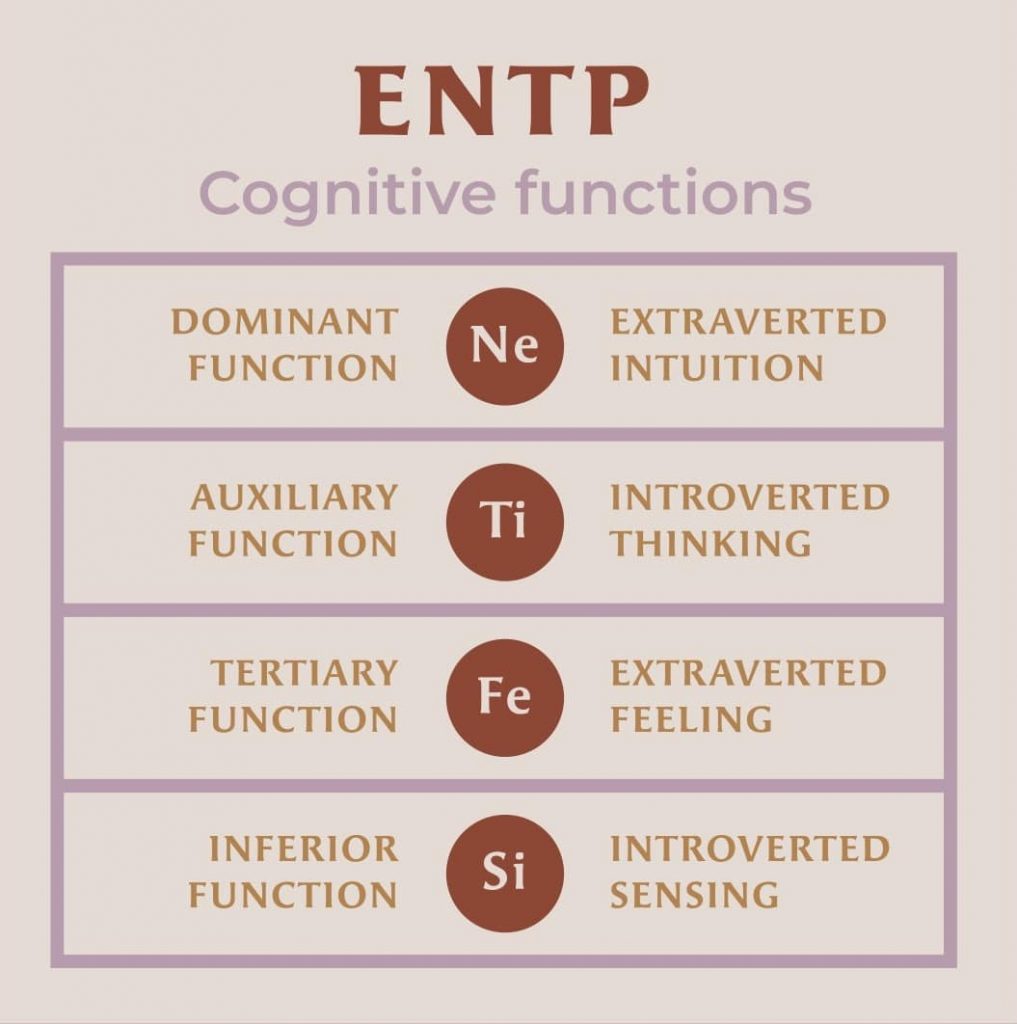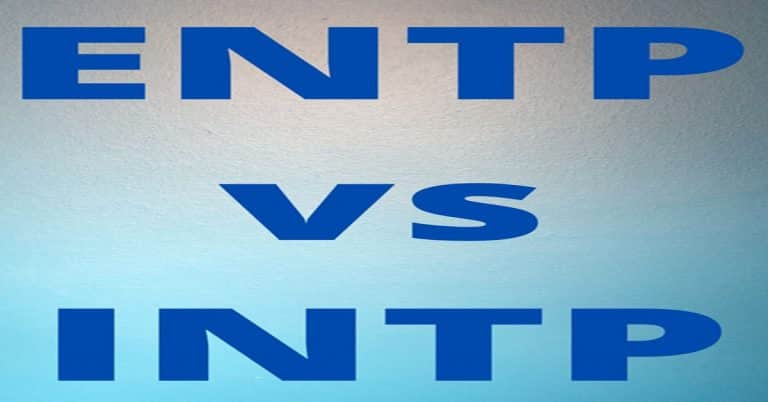ENTP – The Debater
ENTP Meaning:
The ENTP is a fascinating personality type and is comprised of the tendencies of Extravert, Intuitive, Thinking, and Perceiving. Alternative titles and aliases for the ENFP include the Devil’s Advocate and the Visionary. The ENTP can be impressively effective and constructive when they find themselves in conducive environments and contexts.
ENTP’s commonly have a formidable command of language and a razor-sharp wit to match, proving just as effective in social situations as it can within the workplace. While ENTP’s can and do love to playfully banter, they can also make deeply compelling arguments when a particular thought or opinion needs to be swayed.
ENTP’s are primarily energized by engaging with people and the world around them. They love to challenge and debate and may indeed come across as boisterous or over-confident to those who do not share similar temperaments. ENTP’s also thrive on spontaneity and would very much prefer to enter any given situation with little to no planning.
In fact, they tend to find the planning phase to be dry and unnecessary. Rather, they heavily rely on their quick thinking and ingenuity to guide them as they go. ENTP’s also enjoy breaking tradition and established ways of doing things. This innovation and trailblazing mindset make for a charged entrepreneurial spirit that can sometimes come across as overly aggressive, tenacious, and even threatening to others.
ENTP’s thoroughly enjoy the intricacies dynamics of interpersonal relationships and have a rich and genuine appreciation for their interactions with others. However, they commonly tend to become quickly bored or frustrated with those who cannot keep up with them in thought or debate It is therefore essential for the ENTP to approach the world in a balanced manner, and not only expect the rest of the world to flex to them.

ENTP’s and Career:
ENTP’s have a marked potential to be an invaluable part of any given team. They have a curious and inquisitive mind that is constantly seeking innovative and creative solutions to problems, whether they be new or old. They work best when given the freedom to work at their own pace, with little to no micromanagement. In fact, ENTP’s tend to resent too much direction and feel their creativity is fundamentally stifled when reigned-in.
Although they often respect and understand the need for rules in the workplace, they find it debilitating and an assault on their creativity. The ENTP is most comfortable and motivated when given the complete freedom to express their creativity to generate new ideas and ways of doing things. They prefer not to be bogged down by the mundane task of implementing or executing their ideas, preferring to task that to others.
ENTP’s as Direct Reports:
ENTP’s bring ingenuity, creativity, and a high energy to any team. While this may be beneficial and appropriate for specific team dynamics, ENTP’s can be challenging to work alongside. They are zealously competitive and seek to be the top and best in everything they do. If an ENTP is working within a team, they may show anger or disappointment if the team is not performing. If the group performs, ENTP’s tend to consider it primarily due to them and their contributions and often take all the credit for success (even if it is inherently undue).
Suppose an ENTP is given a task with little to no direction. In that case, they will excel at exploring it and analyzing it from every and all angles. Ultimately, they will eventually develop a new and innovative method to approach it or complete it. However, suppose they are assigned a task and are instead provided step-by-step directions to complete it. In that case, they will quickly lose interest and excitement for the job or project and run the risk of becoming disengaged.
Interestingly, type A personalities disproportionately report in as ENTP’s. This is largely attributed to their highly competitive nature. If an ENTP finds themselves on a team that consists of other high-performing competitors, the results are nothing less than awe-inspiring.
ENTP’s as Leaders of Others:
ENTP’s are profoundly charismatic, given their ‘gift of the gab’ and power of persuasion. While this charm does indeed make them admired and revered leaders more often than not, they may also come across as superficial or ingenuine to the more Feeling and Judging personality types.
Nevertheless, the ENTP’s power as a leader primarily comes from his persuasiveness and ability to convey and convince his/her will or opinion in any given context or environment. When leading a team, the ENTP does indeed listen to and vet the ideas and views of the team and has absolutely no qualm about changing direction if they can be convinced of another perspective’s merit. However, the ENTP may appear callous and insensitive to the feelings of others in their relentless pursuit of perfection and success. This pursuit can lead to impatience, frustration and disdain on the part of the ENTP, and can further result in ostracizing the team and losing their engagement as a whole.
While ENTP’s can indeed make for influential leaders and members within a team, their natural strengths are geared more towards independent work. Therefore, it is not surprising that ENTP’s are much more likely to be self-employed than the rest of the other 15 personality types. This self-employment allows their competitiveness, ingenuity, and unbridled creativity to come fully fruition.
Professions:
ENTP’s are most naturally suited for roles that require strategic, innovative, and visionary thinking and ideas. Their unique mind and creative approach lend exceptionally well to Business and Financial career, such as Sales Manager, Advertising, Top Executive, and Investment Banking.
Their innovation and creativity also apply to architecture, arts, and entertainment. An ENTP, therefore, has quite the list of careers to choose from, including architect, engineer, software developer, art director, graphic designer, photographer, journalist, Public relations, acting, and animating.
Also, given their natural ability and affinity for argument and persuasion, they would also make for extremely effective lawyers and judges.
Careers that the ENTP should potentially avoid are those that have a rigid and established routine that offer little to no opportunity for independent or creative thought. This includes such professions as administration, reception, dentistry, teaching, and assistant positions. However, it is essential to note that although these careers do not necessarily appeal to the ENTP’s natural strengths, like all different personality types, this does not mean that the ENTP could not be phenomenally successful at them, but, rather, they may find it more challenging given their tendencies.
ENTP’s and Interpersonal Relationships:
ENTP’s have the potential to form long-lasting and meaningful relationships. However, they may find that it is necessary to slow down or compromise for the sake of any given relationship, which is not the natural tendency for the ENTP. ENTP’s can make for highly engaging, entertaining, and captivating friends and partners. They love constant change and flexibility and seek out others who enjoy the same.
However, ENTP’s should pay special attention to the fact that not all minds or personalities work like theirs. While they can dance across various complex concepts and ideas effortlessly, they need to realize that this may not be the case for others. Without recognizing this, the ENTP tends to have little patience for those who cannot keep up with them and lose interest or engagement exceptionally quickly.

ENTP’s in Friendships:
ENTP’s primarily seek others who can match or keep up with their thoughts and wit. They work best with those that can think on their level. They love a good argument, especially when they are intellectually challenged, and must work for the upper hand in any given conversation. As such, ENTP’s share strong compatibility with the INTP personality type (Introvert, Intuitive, Thinking and Perceiving), the ENTJ personality type (Extravert, Intuitive, Thinking and Judging), the ENFP personality type (Extraverted, Intuitive, Feeling and Perceiving), as well, of course, as other ENTP personality types
.
ENTP’s tend to be at odds with those personality types, predominantly Introvert, to sense and Judging, as they go against two of their prime driving forces, Intuition and Perception. The more challenging personality types for the ENTP to get along with are the ISTJ (Introvert, Sensing, Feeling and Perceiving), the ISFP (Introvert, Sensing, Feeling, Perceiving), ISFJ (Introvert, Sensing, Feeling, Judging), and the ESFJ (Extravert, Sensing, Feeling and Judging). Although these personality types tend to be the most at odds and clashing with the ENTP, that is not to say that solid relationships cannot be forged. However, they do require extra care and attention to be developed into a meaningful relationship.
ENTP’s in Romantic Relationships:
ENTP’s are exciting partners, as they are constantly coming up with new and exciting ideas. Therefore, similar to their approach to friendships, ENTP’s will want to seek out partners who can match their intelligence and wit. If this is lacking or not there, the ENTP may grow restless and seek new and exciting relationships.
However, this is not to say that there are not exceptions. An ENTP may find a different challenge and an unlikely compliment in the following personality types, ISTP (Introvert, Sensing, Feeling and Judging), INFJ (introverted Intuitive, Feeling and Judging), ESTJ (Extravert, Sensing Thinking and Judging, as well as the ESFP (Extravert, Sensing, Feeling and Perceiving).
Regardless of the personality type, the ENTP can come across as overt and overwhelming at times and must therefore keep a constant check to ensure they are not being misrepresented or coming across too harshly, especially when it comes to relationships with the more Feeling tendency and sensitivity.
ENTP’s and Families:
ENTP’s make for strong and interesting parents. They derive a sense of pride from seeing their children engage in the world and for being one of the primary forces that drive and guides them through it. They expect excellence from their children, and their competitiveness can manifest itself in unflattering ways if they are not careful. However, ENTP’s tend to have much more patience for their children than others in their lives and are primarily concerned with exploring and finding their path.
Conclusion:
As such, ENTP’s make for a particularly potent personality type, whether it be in a professional capacity or an interpersonal one. While the ENTP can come across as loud, boisterous, and overly confident in their approach to most things, they can also be captivating, entertaining, and awe-inspiring when in the right environment or relationship. They are masters of speech and oratory and can dominate arguments with great ease.
Their approach to the world is one of vision and entrepreneurial spirit. They prefer to break free of established norms and traditional ways of doing things and instead find a much more creative and practical approach. They are most natural when they are trailblazing. If in an environment or a relationship that stifles their sporadic thought and unique thought process, they quickly grow restless and indeed resentful.
ENTP’s are best suited for independent endeavors from a professional perspective. From an interpersonal perspective, they are best served with those that can challenge and keep up with their ideas and trains of thought.
You can find information on famous people with ENTP personality types such as celebrity actors, sportsmen, characters and other historical characters with this personality type.







